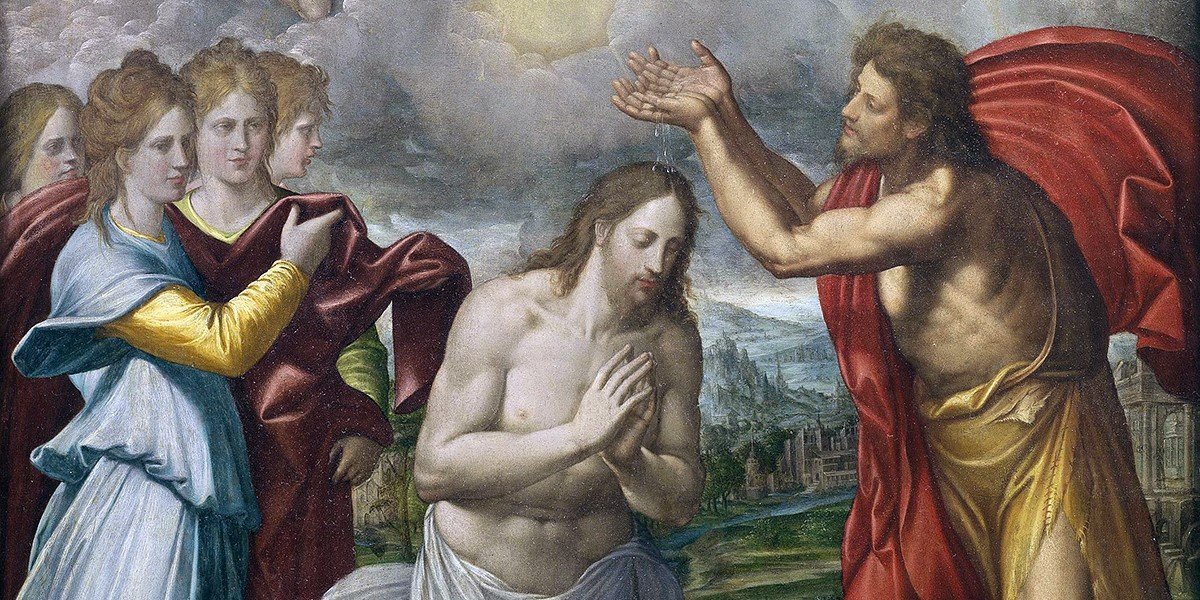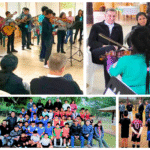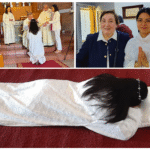
by f. Luis CASASUS, General Superior of the Idente Missionaries
New York/Paris, January 10, 2021. | Baptism of the Lord – Feast
Book of Isaiah 55: 1-11; First Letter of John 5: 1-9; Saint Mark 1: 7-11.
Who could deny that Jesus changed his life when he was baptized? Of course, this does not mean that he went from sin to a virtuous life, but that from that moment on, as the Gospel relates after today’s text, he was led into the desert and then went into Galilee, proclaiming the good news of God.
By doing so, he was showing us that our active entrance into the kingdom of heaven, into God’s plan of salvation, is always through other people, through a community. In his case, through a stunned John the Baptist, who was in charge of opening a new stage in Jesus’ life, which of course was not a change in his moral life, but in his visible and concrete activity to work for the eternal life of people, to show everyone that the kingdom of God has come near (Mk 1: 15), that that eternal life begins now.
And what happens in our case? Exactly the same thing. Well, something else, because we are freed from the power of original sin and from our own sin, even if we continue to do evil deeds, but evil will not succeed in enslaving us, if we accept the grace of baptism. Let us note that this grace is nothing magical, nor is it strictly individual: it is the awareness of being united to a family, to other human beings, sinners like us, but this awareness of not being lonely walkers changes everything…especially in difficult moments, which we all have. In a special way, God uses the lives of Church members to transform other members:
Once upon a time, the people in one small village didn’t have enough to eat, and definitely not enough to store away for the winter. People were afraid their families would go hungry, so they hid the small amounts of food they did have. One day a traveler came into the village. She asked the different people she met about finding a place to eat and sleep for the night. There’s not a bite to eat in the whole village, they told her. You better keep moving on.
Oh, I have everything I need, she said. In fact, I would like to make some stone soup to share with all of you. She was very clever. She pulled a big black cooking pot from her wagon. She filled it with water and built a fire under it. Then, she reached slowly into her knapsack and, while several villagers watched, she pulled a plain gray stone from a cloth bag and dropped it into the water. By now, hearing about the magic stone, most of the villagers joined the traveler and her cooking pot. She sniffed the stone soup and licked her lips. She said, I do like a tasty stone soup. Of course, stone soup with cabbage is even better.
Soon a villager ran from her house into the village square, holding a cabbage. I have this cabbage from my garden, she said as she held it out for the pot of soup. Fantastic! cried the traveler. The traveler cut up the cabbage and added it to the pot. She said, You know, I once had stone soup with cabbage and a bit of beef, and it was delicious. The butcher said she thought she could find some beef scraps. She ran back to her shop, while other villagers offered bits of vegetables from their own gardens– potatoes, onions, carrots… Soon the big black pot was bubbling and steaming. When the soup was ready, everyone in the village ate a bowl of soup, and it was delicious. The villagers offered the traveler money and other treasures for the magic stone, but she refused to sell the stone. The next day she traveled on her way.
Baptism gives us graces and opportunities that thousands of excellent, honest, generous, heroic people who did not receive this sacrament do not have. While following Christ, or imitating Him, is important, Baptism allows us to share God’s life, to become a new creature, which is different.
It is not a question of comparing who is more morally perfect, whether someone who has been baptized or who has not received this sacrament, but of realizing that, in addition to the presence of God in every human being, baptism, specifically, makes us grafted onto the person of Christ, as Pope Francis recalled in 2014, a few days before the Feast we celebrate today. Baptism “grafts” believers as a living member onto Christ and his church, Pope Francis said. In the language of St. Paul, each baptized person becomes part of Christ’s body.
Grafting is a type of vegetal procreation. A branch that is to receive nourishment, is attached to a rootstock which provides the nourishment. The whole purpose of the grafting is to provide fruit.
The gospel says, I am the vine and you are the branches. He who lives in me and I in him will produce fruit abundantly. We are not just members of organized religion Our relationship with God is even deeper than mere confessing that Jesus is our Lord and Savior. He lives in us. We live in Him. The good that we do, the virtue that we practice, flows from the life blood of Jesus Christ that is in our veins.
With Baptism we share in the very life of God. This has important consequences. In particular, if we are honest, our way of loving can be not only very generous, but virtually inexplicable, unless one admit the presence of Christ in our soul. This is the case of martyrs who die forgiving and of those who love their enemies with visible signs and in a consistent way.
The baptized person not only receives strength to overcome adversity, but also a joy that everybody perceives and that we call beatitude; it cannot be attributed to events around the ascetic, because this beatitude is particularly evident in difficult moments, as in persecution, painful opposition of some people, separation, or impotence to do good. These days, we heard it in the Gospel from the mouth of St. John the Baptist: So this joy of mine has been made complete. He must increase; I must decrease.
This example of joyful humility in making way for Jesus and being focused on pointing others to Christ is a challenge to us all. As he fades from the scene of history he leaves a remarkable testimony to who Jesus is. As the last Old Testament prophet he is tasked with pointing to Christ and with the beginning of the New Testament. As John transitions out (I must decrease), he tells his disciples that Jesus must increase.
That is the true sense of abnegation, of detachment, for a disciple of Christ. Not simply to withdraw from the world or to give oneself frantically to some religious or apostolic activity, but to do all that only to make Christ’s way of loving visible to other people, so that they have the opportunity to become infected and enthusiastic about the only thing that can give full meaning to our lives. As the First Reading tells us today: Why spend your money for what is not bread; your wages for what fails to satisfy?
Probably the most profound message that St. Mark transmits to us today with his account of Jesus’ baptism are the words of our heavenly Father: You are my beloved Son; with you I am well pleased. That is the statement we need to hear in our hearts. Let us note that Jesus had not yet worked miracles, or taught the crowds, but he received the deepest comfort a human being can expect: the total trust of his father, the knowledge that we can satisfy the person we love.
Moreover, in the Semitic culture the word child does not mean only the biological generation. It also implies the affirmation of a similarity. Addressing Jesus as his son, God guarantees to identify with him, in his words, in his works, and especially in his supreme act of love, the gift of life. Those who want to know the Father have only to contemplate this son.
A writer of our times relates her personal experience of the power of filial consciousness, the knowledge of being loved by those we admire.
Mary Ann Bird was born with a severe cleft lip. She underwent seventeen surgeries before she reached adulthood. As you can imagine, her misshaped mouth and teeth, along with her garbled speech, made her an item of curiosity to the other kids. And not in a positive way.
In an article she wrote, I was convinced that no one outside my family could love me.
That changed in the second grade when she was in Mrs. Leonard’s class. In her story Mary Ann Bird writes:
I grew up knowing I was different, and I hated it. I was born with a cleft lip, and when I started school, my classmates made it clear to me how I looked to others: a little girl with a misshapen lip, crooked nose, lopsided teeth, and garbled speech. When schoolmates asked, “What happened to your lip?” I’d tell them I’d fallen and cut it on a piece of glass. Somehow it seemed more acceptable to have suffered an accident than to have been born different. I was convinced that no one outside my family could love me.
There was, however, a teacher in the second grade whom we all adored. Her name was Mrs. Leonard. She was a short, happy, sparkling lady. Every year we had a hearing test. Mrs. Leonard gave the test to everyone in the class, and one year I went last. I knew from past years that as we stood against the door and covered one ear, the teacher sitting at her desk would whisper something, and we would have to repeat it back; things like The sky is blue or Do you have new shoes? I waited there and listened and heard words that God must have put into her mouth, seven words that changed my life. Mrs. Leonard said, in her whisper, I wish you were my little girl.
Those words changed my life. I was loved and that brought me out of my shell.
She went on to be a teacher herself, a person of inner beauty and great kindness.
Without a doubt, we all hear that same voice when we really come to empty ourselves of all our fears and ambitions by realizing that we can only love God when we are able to know what worries him, how his children’s pain affects him and we prepare to alleviate it with simple and constant gestures, taking Mary at the foot of the Cross as our model.
This is what our condition as baptized people can lead to if we are faithful to what it means.
That is why Pope Francis encourages Christians to discover and remember the date of their baptism. Otherwise, he fears, they could “lose awareness of what the Lord has done” in them and think of their baptism only as a past event.
Finally, the pope stated: We are called to live out our baptism every day. Let us ask today for the strength to achieve this in ourselves.











